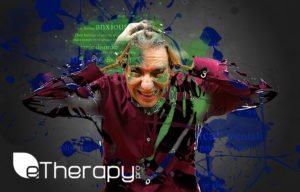
Panic disorder is an anxiety disorder where the person suffers from frequent, sudden, panic attacks. These may last for several minutes, some may be longer, and can happen anywhere. While the feelings they bring on can be extreme, they are not medically harmful in and of themselves. The key is understanding that it is a panic attack and what to do when one is happening.
First, panic attacks and panic disorder itself are sudden, and severe anxiety attacks. Panic attack symptoms include:
- Intense fear or worry
- Impending sense of death or doom
- Feeling overwhelmed
- Feeling out of control
- Shortness of breath/difficulty breathing
- Chest pain
- Sweating/having the chills
- Dizziness
- Numbness or tingling in extremities
- Rapid, pounding heartbeat
- Feeling lightheaded or fainting
- Nausea
To meet the criteria for a diagnosis of panic disorder, the individual must experience repeated panic attacks over a short period of time. It is possible to have a single panic attack, and then never have another one, or to have them infrequently.
What causes panic attacks? Panic attacks occur when the level of stress or anxiety in an individual’s life becomes very intense and overwhelming. The typical coping mechanisms for stress become overwhelming and stop functioning normally. Each person responds to high levels of stress and anxiety differently, and what one person is able to manage, may completely overwhelm another. This is not a judgement of strength, or character, but simply a medical fact.
There is strong evidence for a genetic basis for a predisposition to anxiety disorders. If you have close family members with anxiety, you may be more prone to develop an anxiety disorder.
Living with a high level of stress for an extended period of time may also lead to developing panic disorder. If this is you, seek help now, learn ways to productively manage your stress before it becomes a debilitating panic disorder. Talking to a mental health professional, and learning coping methods can turn your life around, and back towards happiness.
How can someone deal with anxiety and panic disorder? It is possible to learn how to cope with, and overcome, panic disorder. The first thing needed is education. People need to know this is a medical condition where their nervous system is misfiring, and they are not in any medical danger. Another way to manage this condition is with medication; anti-anxiety medication helps lessen anxiety symptoms and lowers chances for future attacks. Lastly, talk therapy can be used to help understand what is going on, what triggers there may be, and ways to calm once the panic attack is starting. Simple breathing exercises, mindfulness techniques, and reassuring self-talk is very helpful in overcoming panic attack, or anxiety attack, symptoms.
Panic disorder is treatable with a high success rate. There are a variety of methods and approaches available. The important thing is to act sooner, rather than later. If you, or a loved one, are experiencing symptoms of anxiety, or panic disorder, reach out to a mental health professional.








